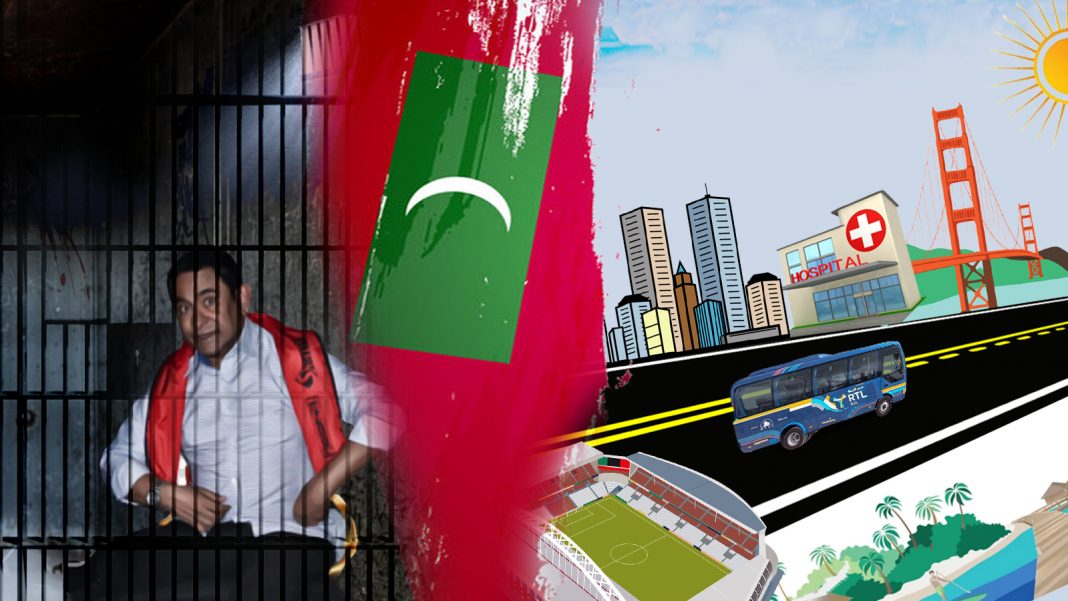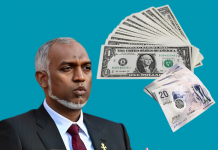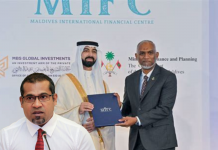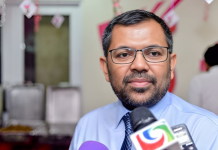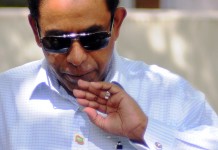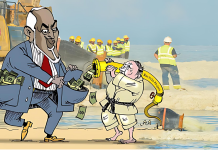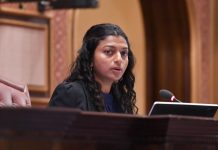Former president Abdulla Yameen, was on December 25 sentenced to 11 years in prison.In addition, the criminal court fined him $5 million.He had been found guilty of corruption and money laundering related to receiving payoffs from a private company. Yameen lost power in 2018, but the Progressive Party of Maldives (PPM) declared him their presidential candidate in the 2023 elections that could be affected his plans to lead the PPM- People’s National Congress, Maldives (PNC) opposition alliance. History has now come full circle for Yameen as the Maldives Constitution disqualifies any candidate convicted of criminal charges and sentenced to a term of more than a year unless they are later acquitted or a three-year period has elapsed since their release.
Earlier, in 2019, he had been sent to jail for five years and fined $5 million for embezzling state funds worth $ 1 million. The illicit gain was acquired through the lease of resort development rights, evidently carried out in a questionable manner. However, his jail sentence was reduced to a house arrest in 2020, and he was later released. Yameen, who is the half-brother of former dictator Maumoon Abdul Gayoom, had resumed active politics since his release. He had been campaigning against Indian influence in Maldives.
Abdulla Yameen was elected president in 2013 as the Progressive Party (PPM) candidate. The initial election was annulled, but Yameen defeated former president and Maldivian Democratic Party (MDP) leader Mohamed Nasheed in a re-run. The country made several moves to strengthen the supremacy of Sunni Islam since Yameen soon after that, blocking all religions except Islam in the nation, ensuring that all laws and regulations adhere to Islamic principles, and developing and strengthening the Islamic Fiqh Academy to issue fatwas. Its foreign policy objectives were geared toward protecting the Islamic unity of the country and promoting Islamic characteristics internationally.
The Maldives has long been a close ally of India. Since both nations gained independence from Great Britain, India has played a significant role in strengthening the Maldivian economy and underwriting political stability in the country.
India’s infrastructure aid, credit lines, loans and commissioning of several projects (Greater Male Connectivity Project, Hanimaadhoo airport, Hulhumale cricket stadium, Gulhifalhu port) have meant a lot as friendly gesture to a neighbor that is keen to keep abreast of latest developments of 21 st century. Whereas soon after taking over, Yameen built a close relationship with China. Beijing didn’t even have an embassy in the Maldivian capital of Malé before 2012, given the smidgeon of diplomatic importance it assigned to the tiny atoll. But a 2015 report by the Center for Global Development claimed that the most prominent Chinese investment projects in Maldives included an $830 million upgrade of the airport and a 1.3-mile bridge to link the airport island with the capital worth $400 million.
The Chinese were also building a 25-story apartment complex and a hospital. As a result, there were concerns that the Chinese had been setting a debt trap. Opposition politicians accused Yameen of allowing a Chinese land grab of 16 islands and inflating the costs for personal gain. Yameen also signed a free trade agreement with China, which he rammed through parliament, allowing legislators only one day to approve it. By 2015, widespread protests against Yameen’s Chinese connection led him to declare an emergency. Supreme Court judges who had ruled for the release of opposition politicians were arrested. Additionally, it raised global concern over what the U.N. human rights chief an “assault on democracy.” Japan claimed that Maldivian tankers had secretly transferred goods to North Korean-flagged ships in grotesque violation of U.N. Security Council sanctions.
There were reports of large-scale human rights violations and suppression of dissent during the tenure of Abdulla Yameen. He had undertaken several autocratic measures like eroding freedom of expression, association or peaceful assembly. Human rights violations included arbitrary mass arrests, whipping as punishment, abuse of women, orders blocking opposition parties from contesting elections, the arrest of Supreme Court justices, and crackdowns on the media to silence critics.
In 2015, in a brazen regression of democracy, former president Mohamed Nasheed was physically dragged to a show trial and found guilty on charges of terrorism and sent to prison for thirteen years. Nasheed was the first democratically elected president of Maldives after over 30 years of autocracy. Unfortunately, according to a report, Yameen’s government showed few signs of seriously reconsidering its approach of intimidating its opposition and making a mockery of the rule of law.
In July 2015, the Yameen government tabled a bill to allow foreign ownership of land. India was concerned that it would provide unprecedented access to foreign parties, like China, to operate and have a toehold in the strategic Indian Ocean region. Until then, foreigners could only lease land for up to 99 years. The bill provided for ownership of land by foreign parties on two conditions. The investment had to exceed $1 billion, and 70 percent of the plot had to be reclaimed. During the debate on the bill in the parliament, Members of Parliament of the ruling party explicitly mentioned that the amendment would help bring in China and Chinese firms.
Voices critical to the government were summarily silenced. According to a Human Rights Watch report, On April 23, 2017, Yameen Rasheed, a prominent blogger and social media activist known for his satirical commentaries on Twitter and his blog, The Daily Panic, was found stabbed in the stairwell of his apartment building in Malé, the capital of the Maldives. His ridiculing of public figures had enraged politicians and religious extremists. As a result, he received threats on social media.
After his death, the police made some arrests but said they believed the attack was the work of angry Islamists rather than politically motivated. Ahead of the presidential elections in September 2018, the government had moved to expand its use of broad and vaguely worded laws to intimidate, arbitrarily arrest, and imprison its critics.
However, opposition candidate Ibrahim Mohamed Solih won the 2018 presidential election inflicting a surprise defeat to Yameen. In early February 2019, the then prosecutor general’s office, the top prosecutor in the Maldives, filed money-laundering charges against Abdulla Yameen over allegations that the former president received one million dollars stolen from state coffers.
It was the country’s biggest-ever corruption scandal, the charges carrying a jail sentence of up to 15 years. A report in Al-Jazeera claimed that more than $79m obtained by the Maldives tourism board from leasing islands for tourism were diverted to private accounts, cashed out, and used to bribe politicians. In secretly filmed interviews, associates of the former president confessed that they delivered some of the stolen cash to Yameen’s residence in black bags.
In October 2020, a court in the Maldives sentenced former Vice President Ahmed Adeeb to 20 years in prison on corruption charges related to leasing tropical islands for hotel development. The 38-year-old had pleaded guilty under a plea bargain. But obviously, with Abdulla Yameen coming to power in 2013, India-Maldives relations spiralled downward with his crackdown on democracy, proximity towards China, and anti-India rhetoric used to muster nationalist sentiments. However the new president, Ibrahim Solih immediately worked to improve the relationship by initiating an ‘India First’ policy.
In addition, close ties and high-level military exchanges since 2018 have boosted up self-confidence of the island state also. The policy prioritised India for economic and defence partnerships, with greater sensitivity to Indian concerns emanating from Chinese investments and activities in Maldives. Meanwhile, The Prosecutor General’s Office forwarded the case against Yameen to court on November 24, 2021. He had been charged Article 53 (a), 5(a) (2) in reference to (3), as well as under Article 53(b), (6) and (7) of the Anti-Money Laundering and Terrorism Financing Act, for laundering money. The second charge comes under Section 510 of the Penal Code, for accepting bribes. Earlier, in November, 2019, Yameen was sentenced to five years in prison after being found guilty of laundering USD one million through state-owned MMPRC via a private company, SOF, during his presidential tenure.
He was also fined $ five million. However, he was transferred to house arrest in April, 2020, following a covid infection in prison. Later, in November, 2020, Maldive’s Supreme Court overturned the five-year prison sentence. Since the culmination of Yameen’s presidency, the situation of Maldives has improved abundantly. Maldives-India relations under the Ibrahim Mohamed Solih is so rewarding, all these factors indicate brighter future for the island state of Maldives in days to come.

